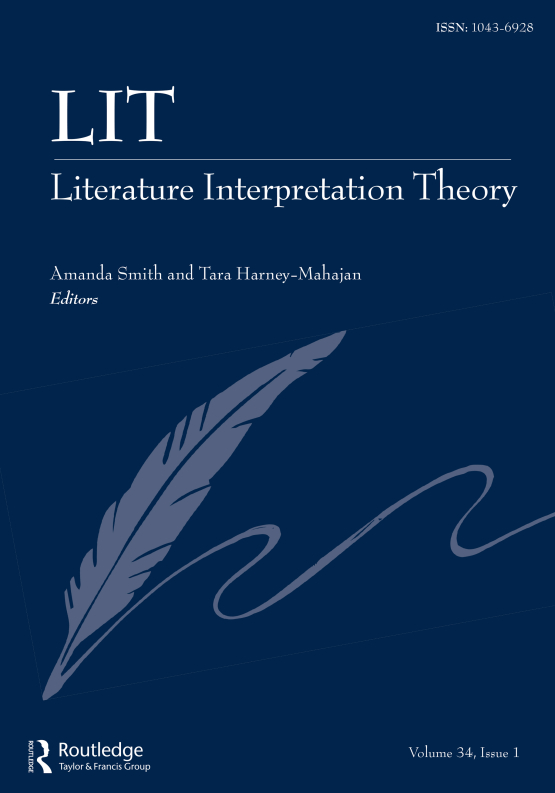Submit a Manuscript to the Journal
Lit: Literature Interpretation Theory
For a Special Issue on
“The Booker Prize: Prize Culture and Global Literary Fiction”
Manuscript deadline
15 September 2024

Special Issue Editor(s)
Molly Ferguson,
Associate Professor of English, Ball State University, Muncie, Indiana, USA.
[email protected]
“The Booker Prize: Prize Culture and Global Literary Fiction”
Since 1969, the Booker Prize has played an outsized role in determining what is serious, or literary, fiction. Dominic Head has called the Booker Prize the “dominant influence, and the institution that is usually held to have breathed the lifeblood back into British literary culture.” And yet, 2011 winner Julian Barnes has called the prize “posh bingo,” suggesting that despite its prestige the Booker is an arbitrary determiner of artistic value in a given year. The prize volcanically propels the careers of those it awards and confers authority to UK (and recently, Irish) publishers, whose books are exclusively eligible for nomination. Changes to prize rules, including its expansion to include any nationality in 2014, publishing long lists, and its rule about not splitting the prize (notably broken with Bernardine Evaristo and Margaret Atwood in 2019), have shaped its selection process and reception by critics.
Significantly, the Booker Prize’s origins in the British empire, and how its colonial legacy reproduces itself, deserves further critical examination. Graham Huggan has argued that the Booker Prize rewards what he calls a “postcolonial exotic” aesthetic–commodifying strategic postcoloniality for commercial consumption, and cultural capital for Britain. The restriction of the prize to UK and Irish publishers, and the segregation of books first published in languages other than English into the International Booker Prize, reflects the higher valuation of British cultural products and reminds us of the origins of the prize limited to Commonwealth nations. Yet while the Booker Prize and its offshoot prizes may represent the framework of enduring imperialism as perpetuated in the publishing industry, the prize has undoubtedly championed debut writers and exposed Western readers to literature from postcolonial nations and marginalized cultures.
While there are many literary and cultural prizes, the Booker remains compelling for its ability to turn some of its winners into literary celebrities, its influence on the publishing industry, its focus on the novel genre, and the consistent literary strategies it rewards. These strategies or themes include: experimental narration, techniques of memory, revelations of generational trauma, national allegory, and colonial nostalgia. Contentions that some winners have written novels specifically to Booker Prize tastes, that certain writers are unofficially banned from the shortlist, or that the prize has become too globally homogenized continue to emerge from insiders to the process. We invite research into and thoughtful engagement with these issues.
This special issue of LIT seeks essays that explore prize culture, national belonging, and/or trends in narrative technique as rewarded and enshrined by the Booker Prize. These may be through critical examination of specific texts, or theoretical assessments of literary prize culture. We seek to identify the ways in which the prize recognizes global cultural shifts or even attempts to shape literary fiction in English. Analysis of race, class, gender, sexuality, nationality, etc. among prize winners or within texts is welcomed. Essays might examine individual prize-winning or short-listed texts or draw comparisons between winning texts to identify a trajectory of themes or narrative strategies that are consistently rewarded. We are especially interested in the ways in which the prize has chronicled the waning influence of the United Kingdom, or perhaps attempted to retain cultural sway for Britain.
Essays may explore the following genres and topics, although this list is not exhaustive:
- Analysis of specific winning Booker texts toward identifying common qualities of a Booker-winning text.
- Feminist and/or critical race theory readings of the Booker Prize, including what it rewards or dismisses.
- Synthesis of one or more of the following prevalent themes/techniques in Booker Prize-winning novels: Memory, imperial nostalgia, frame narrative, experimentation with narration, etc.
- Examination of the longlist or shortlist in a specific year or years to address sociocultural trends and why a specific text might be rewarded or snubbed.
- Analysis of one or more Booker novels using the rubric of “postcolonial exotic” (Huggan) to explore its strategies vis a vis its political orientation, as resistant to or compliant with colonialism.
- Assessments of literary prize culture, including what judges deem as “literary fiction” worthy of this prize. This may be contrasted with “re-readability” as encouraged by judges in certain years.
- Examination of the Booker Prize (its fanfare, rituals, publicity, media representation, ability to build tension) as a vestige of British cultural dominance.
- Comparison of the Booker Prize with other literary or cultural prizes.
- The politics of language and prestige in the Booker Prize vs. the International Booker Prize.
- How the Booker Prize has changed the publishing industry.
- Use of a relevant theoretical lens to explore one or more Booker Prize-winning novels.
- Historical examination of the changes to the Booker Prize through specific winners across decades.
- Literary celebrity and the Booker Prize.
Looking to Publish your Research?
Find out how to publish your research open access with Taylor & Francis Group.
Choose open accessSubmission Instructions
LIT: Literature Interpretation Theory publishes critical essays that employ engaging, coherent theoretical perspectives and provide original, close readings of texts. Submissions must use MLA citation style and should range in length from 5,000-9,000 words. Please direct any questions relating to this CFP to the guest editor Molly Ferguson ([email protected]). Full essay submissions should be emailed to [email protected]. Please also include your contact information and a 100- to 200-word abstract in the body of your email. LIT: Literature Interpretation Theory also welcomes submissions for general issues.